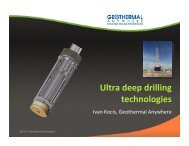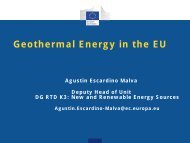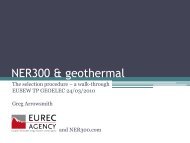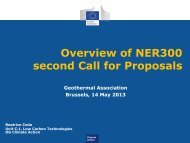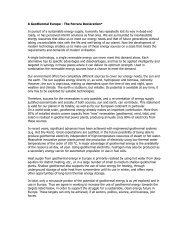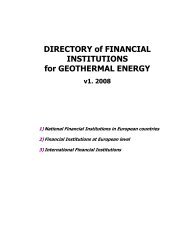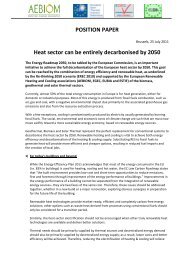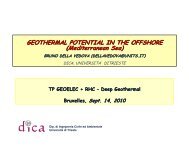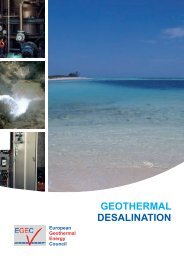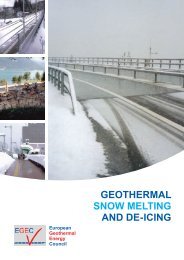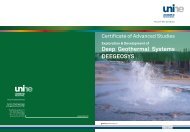Strategic Research and Innovation Agenda for Renewable ... - EGEC
Strategic Research and Innovation Agenda for Renewable ... - EGEC
Strategic Research and Innovation Agenda for Renewable ... - EGEC
Create successful ePaper yourself
Turn your PDF publications into a flip-book with our unique Google optimized e-Paper software.
8<strong>Strategic</strong> <strong>Research</strong> <strong>and</strong> <strong>Innovation</strong> <strong>Agenda</strong> <strong>for</strong> <strong>Renewable</strong> Heating & Cooling<strong>Research</strong> capacities <strong>and</strong> non-technological issuesThe <strong>Renewable</strong> Heating <strong>and</strong> Cooling sector’s objectives fully match those of theEuropean Commission’s <strong>Innovation</strong> Union <strong>and</strong> Europe 2020 strategy 77 . These objectives aimat increasing European R&D, as well as stepping up the emphasis on innovation in energy<strong>and</strong> climate change related technologies. This will improve the competitivenessof both European products <strong>and</strong> companies not only in our internal market but also ona global scale. As shown in this document, research <strong>and</strong> innovation are pivotal to the creationof new products/services that generate growth <strong>and</strong> jobs, thus helping to address socialchallenges. The RHC sector will bring integrated solutions, of new <strong>and</strong> clean energyapplications that will be used in Smart Cities, in nearly zero-energy buildings, inindustry or agriculture. For that purpose, it is important to provide the means, bothtechnical <strong>and</strong> human, <strong>for</strong> the EU to develop innovations in the RHC sector, creating apool of knowledge <strong>and</strong> competence to foster the competiveness <strong>and</strong> attractivenessof the R&D work per<strong>for</strong>med in Europe.8.1 <strong>Research</strong> infrastructure <strong>for</strong> RHCThe strategic development of a research infrastructure <strong>for</strong> renewable heating <strong>and</strong>cooling is essential to promoting the development of RHC solutions in Europe. This entailsexploring synergies between the different technologies comprised in the RHC sector,rein<strong>for</strong>cing <strong>and</strong> further developing a competence pool, enhancing cooperation betweenMember States <strong>and</strong> public - private R&D activities, managing existing know-how <strong>and</strong>facilitating a network of research infrastructures.Strengthening research infrastructureTaking into account the diverse sectors involved in RHC, one of the main priorities isto <strong>for</strong>ge a stronger collaboration or even integration between existing facilities working onRHC R&D at European <strong>and</strong>/or national level. After exploring the synergies created by suchcollaboration, it will be possible to identify the additional needs <strong>for</strong> multidisciplinary researchfacilities. While some facilities can originate from existing ones, upgraded to supportR&D <strong>for</strong> other RHC technologies; some new facilities can be set up to complement or replaceolder ones.Taking into account that RHC technologies are mostly small scale, with productiondistributed across Europe, research facilities should ideally also be spread around Europe,attracting <strong>and</strong> retaining talent away from the main conurbations, thus remaining cost-effective<strong>and</strong> manageable. The uniqueness of the RHC sector allows <strong>for</strong> such specificities. Thediversity of competences required must be well considered <strong>and</strong> an equilibrium found betweentechnologies (solar, biomass, geothermal), cross-cutting needs (hybrid systems, thermalstorage, large scale systems <strong>and</strong> district heating) <strong>and</strong> experimental or testing facilities, <strong>for</strong>instance. Industrial process heat generation, hybrid systems <strong>and</strong> thermal storage are someof the areas where current research infrastructure is inadequate.Cross-sector collaboration <strong>and</strong> networking activitiesDecarbonising the heating <strong>and</strong> cooling sector is a challenging policy objective due to the largenumber of individual decision makers <strong>and</strong> also to the fact that the industry is diverse <strong>and</strong>fragmented. Well-organised networking activities at European level are essential to stimulatecooperation between research institutes <strong>and</strong> industry <strong>and</strong>, in parallel, between differentregions (cross-border <strong>and</strong> cross-sector collaboration). This can result in aneffective knowledge transfer among RHC research <strong>and</strong> innovation per<strong>for</strong>mers, which willrein<strong>for</strong>ce European cooperation <strong>and</strong> facilitate technology development. For instance,a combined approach on both the dem<strong>and</strong> <strong>and</strong> the supply side is required to integrateRHC technologies into the construction process <strong>and</strong> logistics chain. This is why public interventionis needed at EU level to foster collaboration <strong>and</strong> networking between RHC experts<strong>and</strong> stakeholders of relevant disciplines such as architecture, urban planning,or construction. Moreover, further collaboration with energy intensive industries (suchas pulp <strong>and</strong> paper, glass <strong>and</strong> metals) should be established to develop new low-carbon solutions<strong>for</strong> process heat.77European Commission(2012c).78



